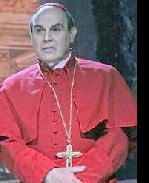SITE GUIDE
SEARCH
REVIEWS
FEATURES
NEWS
Etcetera and
Short Term Listings
LISTINGS
Broadway
Off-Broadway
NYC Restaurants
BOOKS and CDs
OTHER PLACES
Berkshires
London
California
New Jersey
DC
Philadelphia
Elsewhere
QUOTES
TKTS
PLAYWRIGHTS' ALBUMS
LETTERS TO EDITOR
FILM
LINKS
MISCELLANEOUS
Free Updates
Masthead
Writing for Us
A CurtainUp  London Review
London Review
 London Review
London ReviewThe Last Confession
|
In the Vatican everything is confidential and nothing is secret.
---- Cardinal Bernardin Gantin |

David Suchet as Cardinal Benelli
(Photo: Sue Hyman Associates) |
Interestingly this is 61 year old New Yorker Roger Crane's first play and from a man who up to now has been a lawyer. The play has many parts for men, almost all of them of mature years. It is based on the early death of Pope John Paul I (Richard O'Callaghan) who died of a presumed heart attack just 33 days after his election in 1978. Now as one of his first actions was to question the Church's policy on key issues, such as the use of contraception and test tube intervention to create life, he would undoubtedly have been more liberal as a Pope than his predecessor Pope Paul VI (Clifford Rose) or his successor Pope John Paul II. When we add the terrible way in which the Vatican Bank was being run and the later mysterious "suicide" of financier Roberto Calvi, who was found hanging under a bridge in London, it starts to look as if vested interests might have preferred the reforming Pope not to have been elected.
The play takes the form of flashback starting with Cardinal Benelli's (David Suchet) confession to the mysterious confessor (Michael Jayston). Giovanni Benelli is the man who has promoted John Paul I into the papacy. As Cardinal Jean Villot (Bernard Lloyd) tells Benelli in the second act, "He wasn't a Pope. He was a country priest you pushed into the Curia." Suchet instead of playing Christie's Hercule Poirot, here is a detective Cardinal, a power broker who wants to find out what has happened to his unfortunate protegée. But he trades in demands for a full inquest in return for a crack at the papacy himself. We get a picture of the political machinations within the Curia as reactionary Cardinals stifle reform and modernity using the excuse that that is the way it has always been done and that any other path would destabilise the Church.
Suchet is of course magnificent, with an able and experienced supporting cast. He conveys a man who has doubts and who genuinely wants to do the correct thing although that might mean being accused of furthering his own ambition. We are never in doubt that while the others want the power for their own ends, Benelli wants to be Pope to do the best he can. He believes in his ideals although he questions his faith in God. I liked too the simplicity and humility of Richard O'Callaghan's John Paul I making him seem like a lamb when set against the fox of Charles Kay's Cardinal Pericle Felici or the bull of the American Bishop Paul Mancinkus (Stuart Milligan).
William Dudley's set is magnificently marbled with walls to the exterior of grilles where the Vatican Guard are stationed to keep out the people or is it to keep the Pope in? When the Pope attempts to go for a walk on his own, we are told it is more usual for him to be carrried in a litter by eight men. Add the Cardinals in their scarlet robes and it is as if we are watching some splendid spectacle.
The writing is lucid and the motivations clear although the formula is an old fashioned "whodunnit". My only problem is with the juxtaposition of real people with unproved events so that history merges with fiction. It would be most interesting to interview Roger Crane about his research for The Last Confession.
|
THE LAST CONFESSION
Written by Roger Crane Directed by David Jones Starring: David Suchet, Michael Jayston, Richard O'Callaghan, Charles Kay, Joseph Mydell With: Bernard Lloyd, Stuart Milligan, Clifford Rose, John Franklyn-Robbins, Bruce Purchase, Michael Cronin, Joseph Long, Roger May, Paul Foster, Christopher Mellows, Maroussia Frank, Paul Beech, Alan Charklesworth, John Cormack,John Davitt, Adam Napier, Michael Smith-Stewart Set Design: William Dudley Costume Design: Fotini Dimou Lighting: Peter Mumford Music: Dominic Muldowney Running time: Two hours 30 minutes with one interval Box Office: 0870 400 0626 Booking to 15th September 2007 Reviewed by Lizzie Loveridge based on 4th July 2007 performance at the Theatre Royal, Haymarket, London SW1 (Tube: Piccadilly Circus) |
|
London Theatre Tickets Lion King Tickets Billy Elliot Tickets Mary Poppins Tickets Mamma Mia Tickets We Will Rock You Tickets Theatre Tickets |




